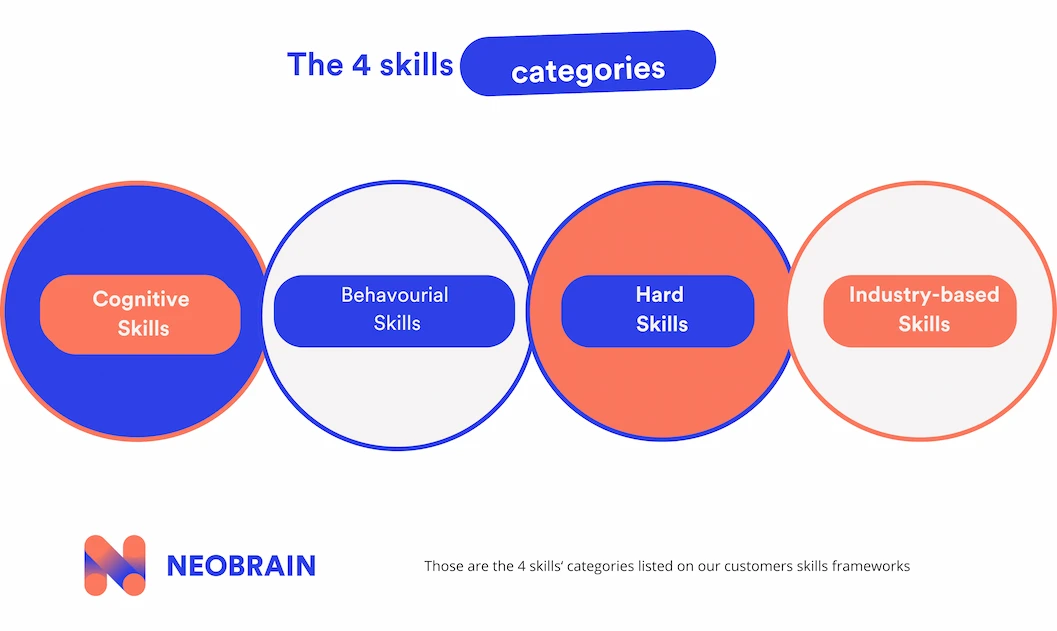Identifying and informing an organization's professional skills categories is a guarantee of clarity and performance for all employees and freelancers.
The changing landscape of professions and industries emphasizes the importance of emerging skills, which offer mutual benefits to companies and employees. Aspects such as remote work, proficiency with digital tools and a focus on sustainability necessitate continuous training and the acquisition of new knowledge.
To prevent the excessive proliferation of business skills listed within the organization, which could undermine the effectiveness of skill management, it is advisable to utilize a typology of skills that is formally structured and maintained in a repository.
How to categorize skills ?
We distinguish 4 categories of skills :
- skills cognitive = Mental and intellectual abilities
- skills behavioral = Attitudes and social interactions
- skills techniques = skills practices and specific tools
- skills sector = Expertise specific to a sector
The cognitive skills
How to define a cognitive skill?
Cognitive skills are cultivated through the mental processes of gathering and processing information to accomplish a certain task. They are the fundamental abilities that the human brain employs for thinking, learning, remembering, reasoning and paying attention to various external stimuli.
These skills are essential for tasks as basic as walking or reading, as well as for more complex activities such as solving mathematical equations.
They also enable us to make decisions based on previously acquired knowledge stored in our memory. They work based on past experiences too.
When discussing this classification of cognitive abilities, we are referring to memory, attention, perception, logical thinking and speed of thought. It is important to note that these skills begin developing during early childhood.
In the workplace, cognitive skills can manifest in various ways, depending on the nature of the job or the activity at hand.
Illustration:
For someone working in the restaurant industry, cognitive skills may involve performing quick, problem-solving and efficient actions. On the other hand, for an architect, cognitive skills might center on logical thinking to create precise and feasible designs.
The behavioral skills or "soft skills"
How to define Behavioral skills?
Behavioral skills are those that cannot be acquired solely through formal education or training (no school can teach behavioral skills). They encompass personal and interpersonal skills. Activities such as extracurricular pursuits, sports, volunteer work and general life experiences are likely to contribute to the development of these skills. Often not readily observable, behavioral skills require detection either through the use of tools or, more commonly, through the attentive and curious support of managers and HR personnel.
This type of skill can be applied to various situations, both personal and professional, and across different sectors of activity. The term commonly used to describe these behavioral skills in many contexts is “transversality.” Specifically, we have explored three trends in the business landscape:
Here are a few examples of skills behavior:
- The ability to listen
- The ability to convince
- Creativity and the proposal of ideas
- Taking the initiative
- Organization, planning
- Stress management
- Kindness to others
- Transport

Illustration of the different types of skills:
For a salesperson, notable business skills include the ability to persuade customers, negotiate and effectively manage stress under different circumstances. These skills are crucial for securing contracts and achieving sales objectives.
These skills are gaining increasing significance in the professional sphere. They contribute to fostering harmonious collaboration with others, enhancing productivity, creating a sense of ease in one’s work, and overall leading to greater fulfillment in terms of doing business or running a company.
While they complement other skills, behavioral skills are highly valued by most managers and can significantly impact the chances of securing a job.
According to the BLS (Bureau of Labour Statistics), 60% of the capabilities needed for perform in a job are related to soft skills.
A variation of soft skills, known as “Mad Skill,” emerged less than five years ago and gained prominence during the Covid-19 pandemic. The Mad Skill involves an extraordinary ability developed outside the professional domain, enabling individuals to establish connections between seemingly unrelated fields.
For example, an actor with improvisation skills can effectively engage in quick and dynamic conversations with clients or colleagues. Companies actively seek such skills as they provide adaptability which is particularly valuable in today’s uncertain times.
How do you assess these faculties? We try to answer this question on the“Talent assessment and progression” page.
The technical skills or "hard skills"
How to define a technical skill?
Technical skills are trade-specific skills. They require training for acquisition. They encompass both knowledge and practical expertise. These skills can be validated through diplomas, certifications and professional experiences.
In this context, a wide range of skills are deployed to suit a particular profession. These skills also undergo rapid evolution and can become outdated sooner than expected, making them the focus of HR development investments.
Illustration:
For instance, examples of technical skills include preparing balance sheets for accountants, developing marketing strategies for marketing managers, proficiently using computer software for HR professionals, undertaking project management for managers and effectively following methodologies or procedures for technicians, among others.
Unlike behavioral skills, technical skills are more easily identified and can be measured using technical tests.
The industry-based skills
How to define the industry-based skills?
Sector-based skills pertain to qualifications and knowledge specific to a particular industry or field. In essence, possessing sectoral skills demonstrates a thorough understanding of the sector’s challenges and culture.
Certain knowledge is industry-specific and closely tied to particular sectors of activity, such as:
- The technology
- Banking / Insurance
- The BTP
- Legal services
- The nuclear industry
- The pharmaceutical industry
- Transport
Illustration:
For a full-stack web developer, their skill set may include familiarity with specific regulations in the healthcare sector or an understanding of its culture. This enables them to effectively communicate and collaborate with peers in the workplace or on related projects.
In many cases, sector-specific skills are acquired through specialized training programs, such as obtaining a Master’s degree in Nuclear Engineering. However, they can also be acquired on the job, particularly in cases of career transition, like an accountant transitioning to a Data Analyst role. Each sector possesses its own distinct vocabulary, challenges and unique culture.
Conclusion
In conclusion, skills are intangible concepts that companies aim to operationalize by defining their requirements and identifying their assets.
Whether technical, sector-specific, behavioral, or cognitive, these skills are manifested within a specific context. This context is crucial not only for recruiting the appropriate individuals but also for engaging motivated talent who are aware of the environmental factors influencing their work.
In the world of work, all categories have their place and need to be developed throughout an individual’s career. Some of them may be cross-disciplinary to various professions and business sectors, and are the common denominators of internal mobility. To help you create mobility more easily from skills , you can take inspiration from our article:”skills transversales et mobilités internes“.
By utilizing this categorization, HR professionals and managers can enhance the management of corporate and human resources by emphasizing the alignment between the organization’s requirements or goals and its pool of available assets.









